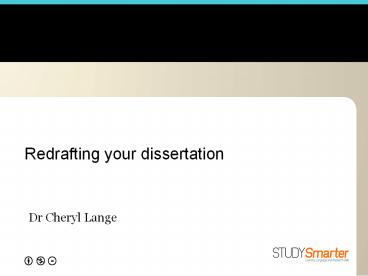Redrafting your dissertation - PowerPoint PPT Presentation
Title:
Redrafting your dissertation
Description:
Redrafting your dissertation Dr Cheryl Lange Results more questions Are the results of my experiments, interviews or other aspects of my own work clearly ... – PowerPoint PPT presentation
Number of Views:101
Avg rating:3.0/5.0
Title: Redrafting your dissertation
1
Redrafting your dissertation
Dr Cheryl Lange
2
Youve finished the first draft - well done
- Dont race off to show it to your supervisor.
- There are still a couple of important things you
need to do.
Set aside your work for a few days
Redraft
Many ideas in this presentation are adapted
from Evans, D Gruba, P 2002 (2nd ed.) How to
write a better thesis, Melbourne, Melbourne
University Press, pp. 123-139.
3
Things to check
Structure
2. Spelling, grammar, punctuation, formatting, etc.
4
Structure some questions
- Is there a table of contents? (check that there
is agreement between the table of contents and
your chapter headings) - Does the Introduction mention
- why the research is being done
- what the aim is
- how the aim will be achieved
- what the scope of the dissertation is?
- Do the conclusions correspond with the aim?
Note areas to be improved in the margins of the text
5
Redraft questions ask yourself
- Does the logic of my argument flow from
introduction to conclusion? (If not, fix up any
gaps, repetitions, problems with order, etc.) - Has my aim shifted during my research? (If yes,
re-write your aim.) - Is there material in the body that would be
better off in an appendix? (If so, move it to an
appendix.) - Have important points emerged that I didnt
consider when structuring my first draft? (If so,
work out how/where to incorporate them.)
6
Results more questions
- Are the results of my experiments, interviews or
other aspects of my own work clearly presented
and explained? - Am I discussing the implications of my results as
I go? (OK if you are doing a dissertation in the
humanities and some social sciences. NOT OK, for
dissertations in physical, biological sciences.)
7
Discussion and Conclusions
- Have I discussed my findings in terms of
improving or extending current theory or
practice? (This may not be necessary for some
coursework dissertations.) - Do my conclusions follow on from my discussion?
(They should.) - Have I introduced new discussion topics into my
conclusion? (If yes, you will have to rewrite
your discussion to include the new ideas or
rewrite your conclusion and leave them out.) - Do my conclusions explain the implications of my
work for theory or practice or provide
recommendations? (They should, depending on your
dissertation requirements.)
8
More redrafting questions
- Does my formatting confirm to the specifications
of my unit/discipline? - Have I checked my spelling thoroughly (dont rely
solely on spell check) - Does my punctuation help the reader understand my
various points of view? - Have I labelled all my tables and figures
correctly? - Have I meticulously checked my referencing?
Redrafting takes time but it MUST be done
9
Want to impress your examiners?
- Use a clear, direct writing style
10
Tips for writing concisely
Circle the prepositions (of, in, about, for, onto, into)
Draw a box around the "is" verb forms
Ask, "Where's the action?
Change the "action" into a simple verb
Move the doer into the subject (Who's kicking whom)
Eliminate any unnecessary slow wind-ups
Eliminate any redundancies.
http//owl.english.purdue.edu/owl/resource/635/1/
11
An example
- http//owl.english.purdue.edu/owl/resource/635/1/
12
More help?
- See Guide to Grammar and Writing Concise
Sentences for lists of redundant phrases
http//grammar.ccc.commnet.edu/grammar/concise.htm
- About.Com Grammar and Compositions lists 200
Common Redundancies http//grammar.about.com/od/w
ords/a/redundancies.htm































